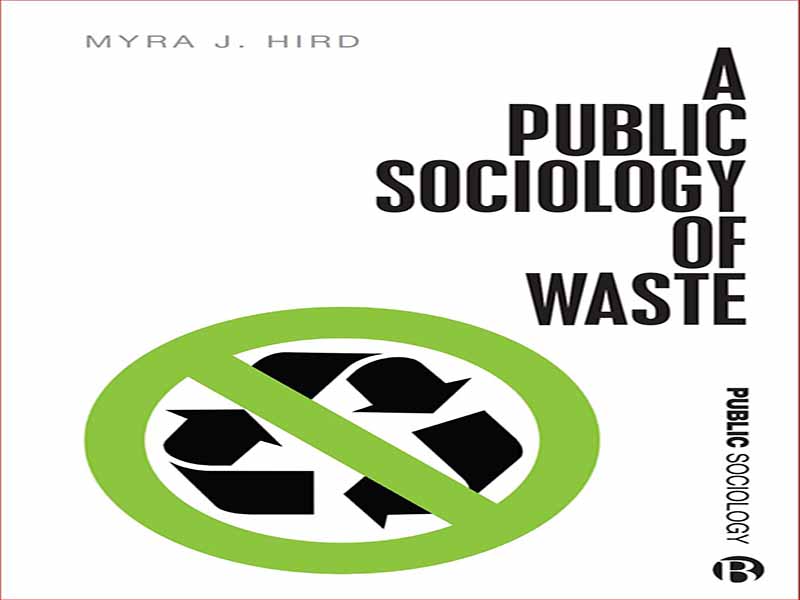- عنوان کتاب: A PUBLIC SOCIOLOGY OF WASTE
- نویسنده: Myra J. Hird
- حوزه: مدیریت زباله
- سال انتشار: 2022
- تعداد صفحه: 160
- زبان اصلی: انگلیسی
- نوع فایل: pdf
- حجم فایل: 6.99 مگابایت
جامعه شناسی یک موضوع بسیار انعکاسی است. همه رشتههای علمی خود را به صورت بازتابی از نظر تئوری و عمل بررسی میکنند، زیرا آنچه را رابرت مرتون، جامعهشناس علم، زمانی «شکگرایی سازمانیافته» مینامید، به کار میگیرند. جامعه شناسی به این بحث دائمی آکادمیک درونی، نگرانی شدید و تقریباً وسواسی در مورد هدف و منطق خود اضافه می کند. این توجه به اصول بنیادین در علاقه فکری قابل توجه به «قانون» متفکران بزرگ و تاریخ آن به عنوان یک رشته، در بحث شدید در مورد مرزهای رشته و در ابداع قابل توجه در توسعه حوزه ها و زیرشاخه های جدید جامعه شناسی خود را نشان می دهد. این شیفتگی به هدف و سازمان اجتماعی این رشته همچنین در بحث در مورد تعهدات مدنی جامعه شناسی، سطح کنشگری و اهداف اخلاقی و سیاسی آن منعکس می شود. این منعکس کننده بحث معاصر درباره ایده جامعه شناسی عمومی است. «جامعه شناسی عمومی» عبارت جدیدی برای یک بحث طولانی در مورد هدف جامعه شناسی است که با منشأ این رشته آغاز شد. بنابراین تصادفی نیست که دانشجویان در قرن بیست و یکم، هنگامی که برای اولین بار با جامعه شناسی آشنا می شوند، با ایده هایی که قرن ها قبل از آن صورت بندی شده بودند دست و پنجه نرم می کنند، زیرا در حالی که تغییرات اجتماعی برخی از این ایده ها را بیهوده کرده است، به ویژه داروینیسم اجتماعی قرن نوزدهم و کارکردگرایی در دهه 1950، آشنایی با این بحثها و چارچوبهای قبلی، لنزی برای درک هدف، ارزش و چشمانداز جامعهشناسی است که متفکران کلیدی در گذشته آن را تصور میکردند. ممکن است ایده ها تغییر کرده باشند اما هدف اخلاقی تغییر نکرده است. مقدر است که یک رشته مناقشه برانگیز در مورد گذشته خود مدام بحث کند. برخی ریشه های جامعه شناسی را در اسکولاستیک قرون وسطی، در اسکاتلند قرن هجدهم، با درگیری روشنگری اسکاتلند با تغییرات اجتماعی ناشی از تجارت، در واکنش های محافظه کارانه به روشنگری یا مواجهه قرن نوزدهم با اثرات منفی صنعتی شدن و مدرن شدن می دانند. با این حال، رشتههای بحثانگیز، اگر چشماندازی برای آینده خود ایجاد نکنند، محکوم هستند که همیشه در گذشته خود زندگی کنند. احساس هدف و منطقی که این رشته را به جلو می برد. جامعه شناسی همیشه رو به جلو بوده است و تحلیل و تشخیصی از آنچه سی. رایت میلز دوست داشت شرایط انسانی بنامد ارائه می دهد.
Sociology is a highly reflexive subject. All scholarly disciplines examine themselves reflexively in terms of theory and practice as they apply what the sociologist of science Robert Merton once called ‘organised scepticism’. Sociology adds to this constant internal academic debate a vigorous, almost obsessive, concern about its very purpose and rationale. This attentiveness to founding principles shows itself in significant intellectual interest in the ‘canon’ of great thinkers and its history as a discipline, in vigorous debate about the boundaries of the discipline, and in considerable inventiveness in developing new areas and subfields of sociology. This fascination with the purpose and social organization of the discipline is also reflected in the debate about sociology’s civic engagements and commitments, its level of activism and its moral and political purposes. This echoes the contemporary discussion about the idea of public sociology. ‘Public sociology’ is a new phrase for a long- standing debate about the purpose of sociology that began with the discipline’s origins. It is therefore no coincidence that students in the 21st century, when being introduced to sociology for the first time, wrestle with ideas formulated centuries before, for while social change has rendered some of these ideas redundant, particularly the social Darwinism of the 19th century and functionalism in the 1950s, familiarity with these earlier debates and frameworks is the lens into understanding the purpose, value and prospect of sociology as key thinkers conceived it in the past. The ideas may have changed but the moral purpose has not. A contentious discipline is destined to argue continually about its past. Some see the roots of sociology grounded in medieval scholasticism, in 18thcentury Scotland, with the Scottish Enlightenment’s engagement with the social changes wrought by commercialism, in conservative reactions to the Enlightenment or in 19th- century encounters with the negative effects of industrialization and modernization. Contentious disciplines, however, are condemned to always live in their past if they do not also develop a vision for their future; a sense of purpose and a rationale that takes the discipline forward. Sociology has always been forward looking, offering an analysis and diagnosis of what C. Wright Mills liked to call the human condition.
این کتاب را میتوانید از لینک زیر بصورت رایگان دانلود کنید:
Download: A PUBLIC SOCIOLOGY OF WASTE



































نظرات کاربران